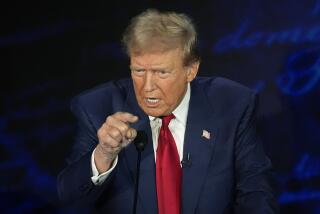Kerry Accuses President of ‘Historic’ Mistakes in Iraq
- Share via
NEW YORK — Accusing President Bush of creating “a crisis of historic proportions” in Iraq, Sen. John F. Kerry on Monday said the ousting of dictator Saddam Hussein was not worth the chaos that has ensued.
Kerry, offering his most sweeping and detailed attack on Bush’s handling of Iraq, said the president had “failed to tell the truth” about his reasons for going to war and about its cost in troops and money. He termed the war a “profound diversion” from the fight against “our greatest enemy, Osama bin Laden,” that had left Americans less secure.
“In Iraq, this administration has consistently over-promised and under-performed,” Kerry said. “This policy has been plagued by a lack of planning, an absence of candor, arrogance and outright incompetence. And the president has held no one accountable, including himself.”
Bush quickly fired back at his Democratic rival, repeating his claims that Kerry had taken shifting and contradictory positions on Iraq.
“Apparently, [Kerry] woke up this morning and has now decided, ‘No, we should not have invaded Iraq’ -- after just last month saying he still would have voted for force, even knowing everything we know today,” Bush told supporters in Derry, N.H. “Incredibly, he now believes our national security would be stronger with Saddam Hussein in power, not in prison.”
Kerry has struggled during the campaign to clearly differentiate his stance on Iraq from Bush’s policy. Kerry flummoxed even some of his own supporters with his comment in August -- to which Bush was referring Monday -- that he still would have voted to give the president authority to invade Iraq had he known then that the country had no weapons of mass destruction.
But Kerry’s speech Monday at New York University represented his most pointed effort to draw distinctions with Bush on Iraq. His remarks came in the wake of polls showing that Bush’s credentials on national security were his strong suit among voters.
The recent surveys have found that Bush’s stature as commander in chief has risen, even amid an upsurge in violence in Iraq and escalating concerns among U.S. lawmakers that stability there remains elusive.
The grim news from Iraq continued Monday, with the apparent beheading of an American construction contractor who had been kidnapped by militants last week in Baghdad.
Iraq promises to remain at center stage today, as Bush delivers his annual address to the U.N. General Assembly, many of whose members oppose the U.S.-led war. Later in the week, interim Iraqi Prime Minister Iyad Allawi is scheduled to address both the United Nations and a joint session of the U.S. Congress, in which he is expected to offer assurances about his government and the direction Iraq is heading.
The latest clash between the two presidential candidates over Iraq exemplified the broader message each was pushing with election day six weeks away. Bush has argued that his rival vacillates too often to be trusted as a leader, whereas Kerry has contended that the president lacks sound judgment.
Although Kerry’s campaign had said it would focus more on domestic matters this month and next, advisors decided he also needed to intensify his criticism of the administration’s foreign policy. They think that Bush’s handling of Iraq reinforces their argument that he makes bad decisions.
“This goes to his character,” said Joe Lockhart, a senior advisor to Kerry. “When you look at Iraq, there’s nothing that does it better. Every decision [the administration] made has been the wrong one.”
Kerry aides said their potential opening was evident in a recent New York Times/CBS News poll, which found that about 80% of those surveyed believe Bush was either “hiding something” or “mostly lying” in talking about the war in Iraq. But, underscoring Kerry’s challenge in swaying voters, 60% of respondents in the same poll said they were not confident Kerry would deal wisely with an international crisis.
The Massachusetts senator attempted to change that impression Monday, using his speech to a receptive audience to lay out a four-point plan for improving conditions in Iraq.
Kerry called on the president to persuade international leaders to contribute more troops and money to secure the country, and to expand the training of Iraq’s security forces.
Additionally, he said Bush must accelerate the development of the country’s infrastructure in a way “that finally brings tangible benefits to the Iraqi people,” and that the U.S. should take stronger steps to protect next year’s scheduled elections in Iraq.
“If the president would move in this direction ... we could begin to withdraw U.S. forces starting next summer and realistically aim to bring all our troops home within the next four years,” Kerry said. “If we do not change course, there is the prospect of a war with no end in sight.”
Noting that Bush has acknowledged “miscalculations” in Iraq, Kerry said, “that is one of the greatest understatements in recent American history. His were not the equivalent of accounting errors. They were colossal failures of judgment -- and judgment is what we look for in a president.”
Kerry was among the lawmakers who voted in October 2002 to give the president authorization to use military force against Iraq. But he has since charged that the U.S. invaded Iraq before U.N. weapons inspectors were given a full chance to work and with insufficient international support.
“This president -- any president -- would have needed the threat of force to act effectively” in persuading Hussein to comply with U.N. weapons inspections, Kerry said Monday in discussing his 2002 vote. “This president misused that authority.”
The two campaigns tangled more directly than they had in the past over the benefit to U.S. security of removing Hussein from power.
Kerry said that Bush’s two main rationales for the war -- that Hussein held weapons of mass destruction and had links to Al Qaeda -- had “been proved false by the president’s own weapons inspectors and by the 9/11 commission.”
“President Bush tells us that he would do everything all over again, the same way. How can he possibly be serious?” Kerry asked. “Is he really saying that if we knew there were no imminent threat, no weapons of mass destruction, no ties to Al Qaeda, the United States should have invaded Iraq? My answer is no -- because a commander in chief’s first responsibility is to make a wise and responsible decision to keep America safe.”
Kerry called Hussein “a brutal dictator who deserves his own special place in hell.” But, he said, “that was not, in itself, a reason to go to war. The satisfaction we take in his downfall does not hide this fact: We have traded a dictator for a chaos that has left America less secure.”
Bush, at his campaign stop in New Hampshire, responded sharply to Kerry’s comments and used them to support his case that the Massachusetts senator’s positions on Iraq had been inconsistent.
“He’s saying he prefers the stability of a dictatorship to the hope and security of democracy,” Bush said. “I couldn’t disagree more, and not so long ago, so did my opponent.”
Bush also referred to remarks Kerry made when former Vermont Gov. Howard Dean, a staunch opponent of the war, was leading in polls taken before the Democratic primaries. Bush said: “Last December, [Kerry] said this, and I quote, ‘Those who doubted whether Iraq or the world would be better off without Saddam Hussein and those who believe we are not safer with his capture don’t have the judgment to be president or the credibility to be elected president.’ End quote.”
Bush added: “I could not have said it better.”
Kerry aides said Bush took the comment out of context. They said Kerry had made the remark in response to a comment by Dean that Hussein’s capture had not made Americans safer.
“John Kerry was talking about the difference between Saddam Hussein being free in Iraq to direct insurgency operations against our troops versus being captured,” Lockhart said.
Vice President Dick Cheney also jumped into the fray during a campaign appearance in Cornwall, Pa. “Depending on what day of the week it is when you catch John Kerry, he’s supportive of what we’re trying to do, or he wants to change it, or he wants to retreat,” Cheney said. “It’s difficult to tell.”
Kerry sought to portray Bush as the inconsistent one. “By one count, the president offered 23 different rationales for this war. If his purpose was to confuse and mislead the American people, he succeeded,” he said in his speech.
In New Hampshire, the president stressed that, in his view, Hussein was a danger and that the nation’s tolerance for security threats was lower after the Sept. 11 attacks.
“I had to either trust a madman [and] forget the lessons of Sept. 11, or take the tough decision to defend our country. Given that choice, I will defend America every time,” Bush said.
Bush acknowledged the upsurge in violence in Iraq, saying “it breaks my heart” to hear of the deaths of Iraqis and American soldiers.
“But I understand what’s going on. These people are trying to shake the will of the Iraqi citizens and they want us to leave,” Bush said. “It’s a mistake to pull out. Can you imagine what Iraq would be like if Saddam Hussein were in power? ... We know he had the capability of making weapons. It was just a matter of time.”
Kerry rejected that argument for war. “Thirty-five to 40 countries have greater capability to build a nuclear bomb than Iraq did in 2003,” he said to an enthusiastic audience of several hundred students and community leaders. “Is President Bush saying we should invade all of them?”
Times staff writers James Gerstenzang, Michael Finnegan and Peter Wallsten contributed to this report.
More to Read
Get the L.A. Times Politics newsletter
Deeply reported insights into legislation, politics and policy from Sacramento, Washington and beyond. In your inbox three times per week.
You may occasionally receive promotional content from the Los Angeles Times.










